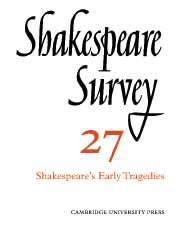Book contents
- Frontmatter
- Shakespeare’s Earliest Tragedies: ‘Titus Andronicus’ and ‘Romeo and Juliet’
- The Aesthetics of Mutilation in ‘Titus Andronicus’
- The Motif of Psychic Division in ‘Richard III’
- The Antic Disposition of Richard II
- The Prince of Denmark and Claudius’s Court
- ‘Hamlet’ and the ‘Moriae Encomium’
- The Relation of Henry V to Tamburlaine
- Shakespeare and the Puritan Dynamic
- Equity, ‘The Merchant of Venice’ and William Lambarde
- ‘Love’s Labour’s Won’ and the Occasion of ‘Much Ado’
- The Date and Production of ‘Timon’ Reconsidered
- Shakespeare, Her Majesty’s Players and Pembroke’s Men
- Judi dench talks to Gareth Lloyd Evans
- Shakespeare Straight and Crooked: A Review of the 1973 Season at Stratford
- The Year's Contributions to Shakespearian Study 1 Critical Studies
- 2 Shakespeare’s Life, Times, and Stage
- 3 Textual Studies
- Index
- Plate section
The Date and Production of ‘Timon’ Reconsidered
Published online by Cambridge University Press: 28 March 2007
- Frontmatter
- Shakespeare’s Earliest Tragedies: ‘Titus Andronicus’ and ‘Romeo and Juliet’
- The Aesthetics of Mutilation in ‘Titus Andronicus’
- The Motif of Psychic Division in ‘Richard III’
- The Antic Disposition of Richard II
- The Prince of Denmark and Claudius’s Court
- ‘Hamlet’ and the ‘Moriae Encomium’
- The Relation of Henry V to Tamburlaine
- Shakespeare and the Puritan Dynamic
- Equity, ‘The Merchant of Venice’ and William Lambarde
- ‘Love’s Labour’s Won’ and the Occasion of ‘Much Ado’
- The Date and Production of ‘Timon’ Reconsidered
- Shakespeare, Her Majesty’s Players and Pembroke’s Men
- Judi dench talks to Gareth Lloyd Evans
- Shakespeare Straight and Crooked: A Review of the 1973 Season at Stratford
- The Year's Contributions to Shakespearian Study 1 Critical Studies
- 2 Shakespeare’s Life, Times, and Stage
- 3 Textual Studies
- Index
- Plate section
Summary
The comedy known as the ‘old Timon’ is of interest largely because of its possible connection with Timon of Athens. Numerous similarities between the two plays have been traced to Lucian’s dialogue Misanthropos: Timon’s extravagant spending; his payment of a friend’s debt to release the friend from prison; his loss of wealth and subsequent discovery of gold in the earth; the reappearance of his parasitic friends to feign generosity when he no longer needs it; his driving them away with a spade; and the final implication that his prodigality was unwise and his choice of friends, indiscriminate. All these similarities suggest that both Shakespeare and the anonymous author (or authors; the MS., written in alternating Italian and Secretary hands, indicates that the play may have been a collaboration) had either direct or indirect access to Lucian.
But the two plays have a number of similarities which cannot be accounted for by their sharing of a source - neither Lucian, nor Plutarch, nor any Renaissance treatment of the Timon legend.3 Among these similarities are a strong emphasis on Timon in prosperity (three acts in each play); scenes in which his parasitic friends refuse to reciprocate his generosity; a mock-banquet at which Timon, destitute, rails at them (he pelts them with stones painted as artichokes in Timon; in Timon of Athens, stones undisguised); and the presence of a faithful steward who remonstrates against his extravagance, follows him into exile, and helps him to drive off the parasites.
- Type
- Chapter
- Information
- Shakespeare Survey , pp. 111 - 128Publisher: Cambridge University PressPrint publication year: 1974
- 1
- Cited by



